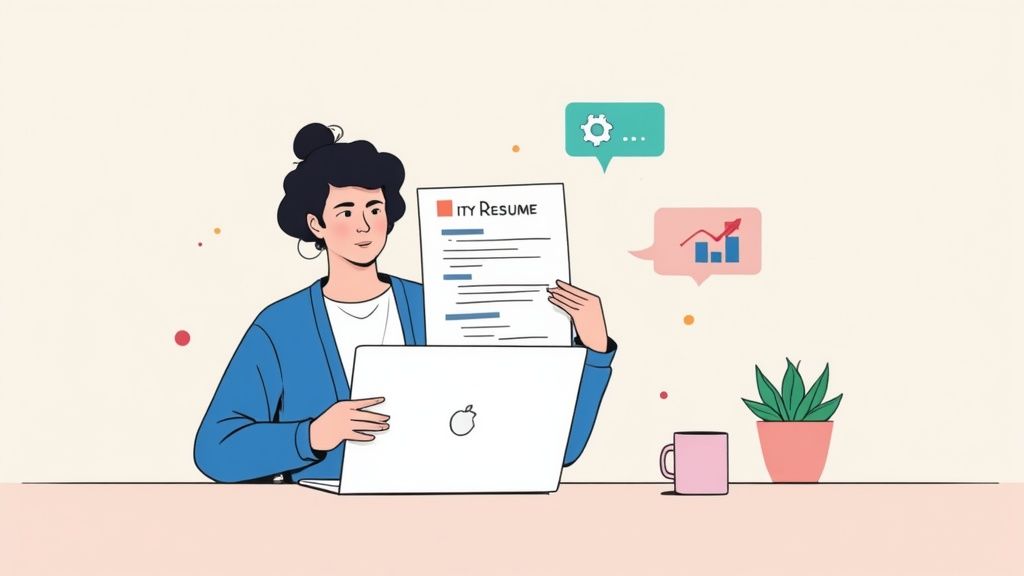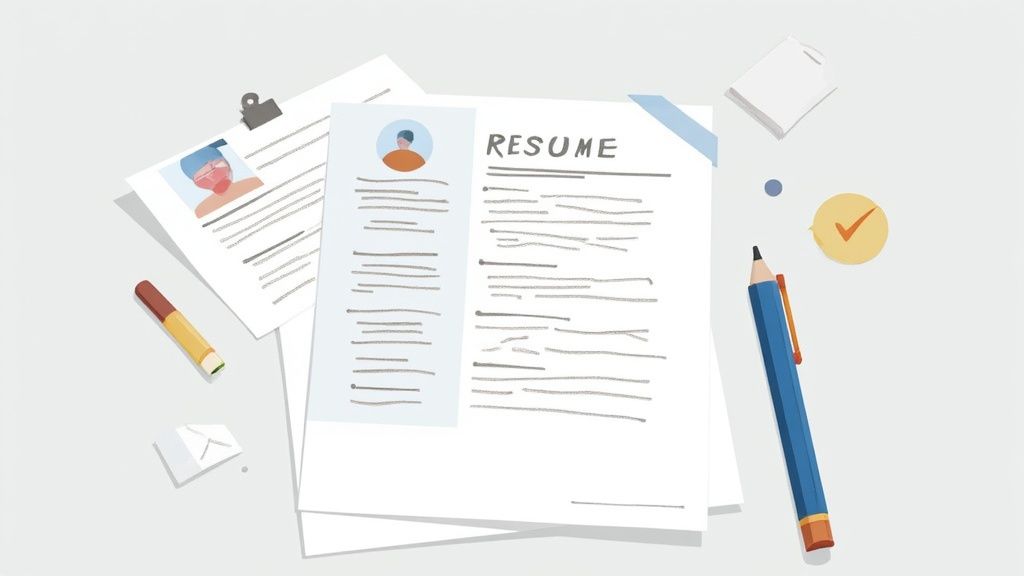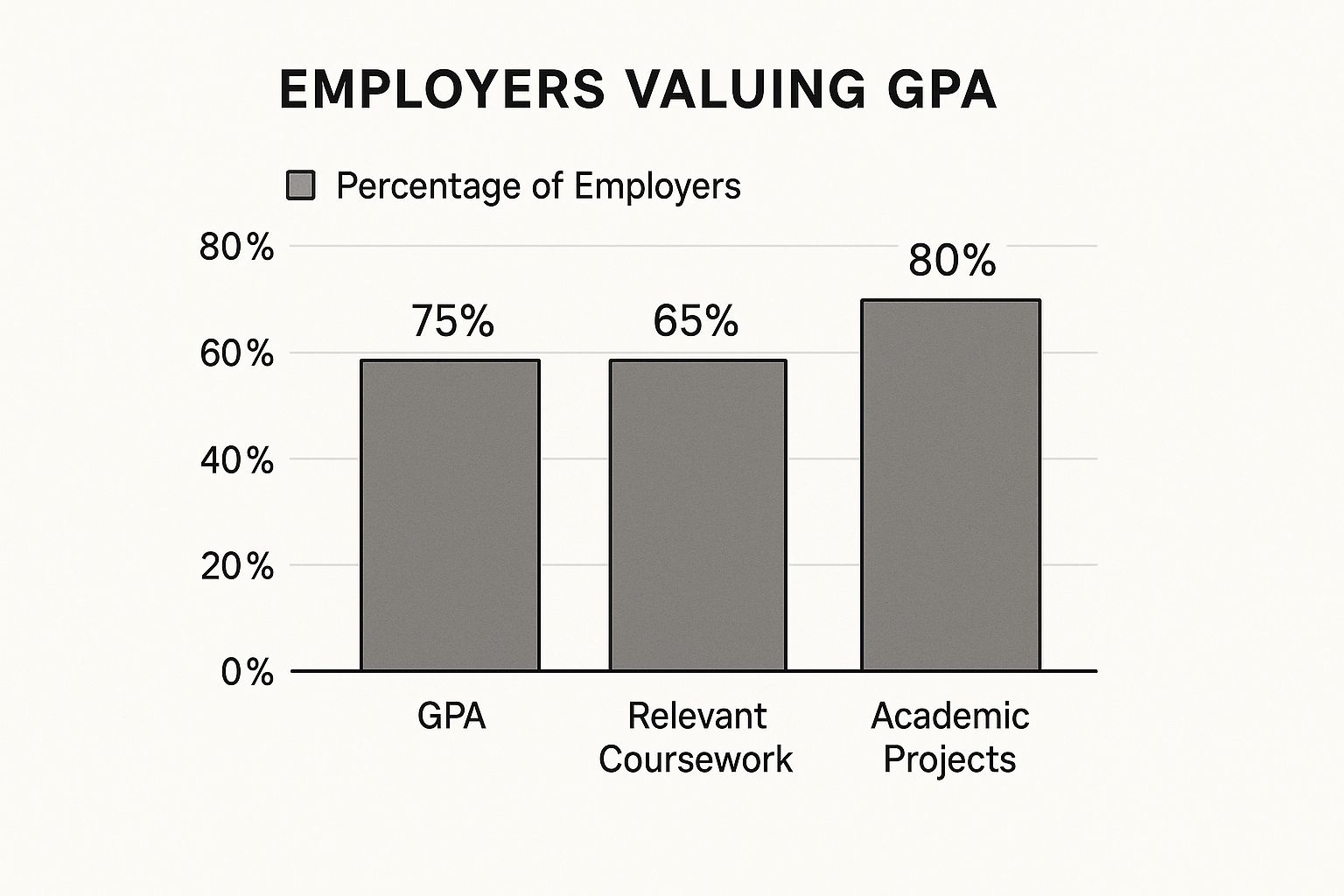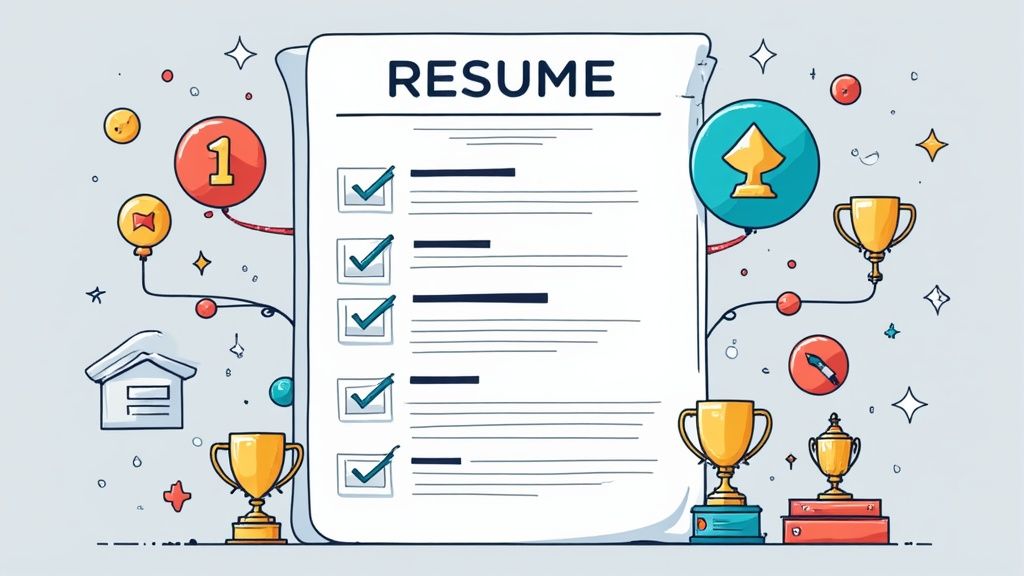A Guide to Your First Resume for a Graduate Job

When you're a recent graduate, your resume isn't about a long list of past jobs. It’s all about potential. The key is to strategically showcase your academic projects, internships, and even relevant coursework to prove you have the skills employers are looking for, even if you don't have years of formal experience under your belt.
Why Your Graduate Resume Needs a Different Approach
That first resume after graduation can feel like a huge hurdle. You’re trying to break into a crowded job market, and it’s easy to feel like you’re at a disadvantage. You're not alone in feeling this way. With economic shifts and new technologies, a staggering 75% of college seniors are worried about their job prospects. It's a real concern, and it makes standing out more critical than ever.
This guide is designed to help you shift your perspective. Stop thinking about what you lack in experience and start focusing on the incredible value you bring from your education. I'll show you how to reframe your story from "just a student" to an "emerging professional" brimming with potential. We’ll go section by section, giving you the right language and real-world examples to make your qualifications pop for hiring managers.

Make the Top of Your Resume Work for You
Recruiters spend mere seconds on a resume, and almost all of that initial glance happens at the very top. This is your prime real estate—your one shot to make them stop scrolling.
Let's start with your professional summary. Throw out that old, tired "Objective" statement. Nobody cares what you want; they care what you can do for them. Instead, think of this as your 2-3 sentence elevator pitch. It should be a tight, powerful statement that highlights your top skills, your academic background, and what you're aiming for professionally. Make it specific to the job you're applying for.
Next up is your education. Don't just list your degree and graduation date. Turn it into a selling point. Did you take advanced courses directly related to the role? List them. Did you graduate with honors or write a killer thesis on a relevant topic? That’s gold—put it in there.
By framing your academic experience this way, you're not just a graduate; you're a candidate with demonstrated knowledge. For a deeper dive into making every section shine, explore our complete guide on resume optimization techniques.
Turn Your Academic Work into Real-World Value

When you're a recent graduate, the "experience" section on your resume is less about past job titles and more about future potential. Don't fall into the trap of thinking you have nothing to show. This is your chance to shine a spotlight on internships, meaty academic projects, and even meaningful volunteer work.
The trick is to stop listing duties and start showcasing your impact. You have to translate what you did in the classroom into the language of the workplace. So, instead of simply saying you “helped with a project,” get specific and show the result.
Think of it this way: You could say, "Collaborated with a 4-person team to analyze market data for a capstone project, presenting findings that identified a 10% growth opportunity."
See the difference? That single sentence proves you can work in a team, analyze data, and contribute to tangible business outcomes. It’s all about framing your academic achievements as professional skills.
By the way, if you're wrestling with whether to include your grades, we have a whole guide on the pros and cons of putting your https://aiapply.co/blog/gpa-on-resume.
Showcase Your Most In-Demand Skills
Let's be real: your skills section is often the first—and sometimes only—thing a recruiter scans. It’s also your golden ticket past the automated systems (ATS) that filter applications before a human ever sees them. So, how do you make it count?
Start by breaking your skills into logical groups. Think in terms of 'Technical Skills' (like Python, Canva, or Salesforce) and 'Soft Skills' (like Team Leadership or Public Speaking). This simple organization makes your resume instantly easier to read and helps a recruiter quickly confirm you have what they’re looking for.
Get Specific to Stand Out
Vague skills just don't cut it anymore. Anyone can write "Microsoft Office," but that doesn't tell a hiring manager anything useful.
Instead, show them exactly what you can do. Swap out the generic for the specific: "Advanced Excel (Pivot Tables, VLOOKUP)." This small tweak immediately communicates a higher level of expertise and gives them a concrete idea of your capabilities. It shows you didn't just use it for a class project once; you actually know your way around the software.

What Employers Really Want to See
The job market has shifted. While technical abilities are still crucial, employers are increasingly focused on the human element. In fact, a staggering 86% of employers now say they prioritize soft skills like critical thinking and problem-solving over GPA.
To give you a better idea of how to position your own skills, take a look at this breakdown.
Prioritizing Skills on a Graduate Resume
Thinking this way helps you frame your experiences—even academic ones—in the language that hiring managers value most right now.
For more insights on how to frame your resume, especially at the top, check out our guide on 7 winning objective tips for a fresher resume in 2025.
Give Your Resume That Final Polish

You’ve done the hard work of gathering your experiences. Now it’s time for the final, crucial step: making it look professional and sharp. A great resume isn't just about the words; the presentation can make or break your first impression.
Nail the Formatting
Think clean and easy to read. You want the hiring manager's eyes to glide right to the important stuff, not get lost in a cluttered mess.
- Choose a Classic Font: Stick with something professional and universally readable like Calibri, Garamond, or Arial.
- Embrace White Space: Don't cram everything in. Proper margins and spacing between sections make the document feel less intimidating and much easier to scan.
- The One-Page Rule: As a recent graduate, this is your golden rule. Sticking to one page forces you to be ruthless with your editing and showcases only your most relevant achievements. It proves you can be concise and impactful.
Tailor, Tailor, Tailor
I can't stress this enough: sending the same generic resume everywhere is a recipe for rejection. You have to customize it for every single application.
Go back to the job description and look for key skills and responsibilities. Now, mirror that language. If they're looking for a "team player with project management skills," make sure your resume explicitly uses those phrases when describing your group projects. This simple act shows the recruiter you’re not just spamming applications—you're genuinely interested in this role.
The Final Read-Through
Okay, you’re almost there. But before you hit "send," you have to proofread like your career depends on it... because it just might. A single typo can signal carelessness and immediately cast doubt on your attention to detail.
Read it forward. Read it backward. Have a friend or a mentor look it over with fresh eyes. Understanding why a resume is important really puts this into perspective—it’s your professional handshake, so make sure it's a firm and flawless one.
Got Questions About Your Graduate Resume? We Have Answers.
Putting together your first real-world resume can feel like you're trying to solve a puzzle with half the pieces missing. It's totally normal to have a ton of questions.
Let's clear up some of the most common worries and sticking points graduates run into. And if you want a masterclass in what not to do, checking out these bad resume examples can be a surprisingly helpful way to avoid common pitfalls.
When you're a recent graduate, your resume isn't about a long list of past jobs. It’s all about potential. The key is to strategically showcase your academic projects, internships, and even relevant coursework to prove you have the skills employers are looking for, even if you don't have years of formal experience under your belt.
Why Your Graduate Resume Needs a Different Approach
That first resume after graduation can feel like a huge hurdle. You’re trying to break into a crowded job market, and it’s easy to feel like you’re at a disadvantage. You're not alone in feeling this way. With economic shifts and new technologies, a staggering 75% of college seniors are worried about their job prospects. It's a real concern, and it makes standing out more critical than ever.
This guide is designed to help you shift your perspective. Stop thinking about what you lack in experience and start focusing on the incredible value you bring from your education. I'll show you how to reframe your story from "just a student" to an "emerging professional" brimming with potential. We’ll go section by section, giving you the right language and real-world examples to make your qualifications pop for hiring managers.

Make the Top of Your Resume Work for You
Recruiters spend mere seconds on a resume, and almost all of that initial glance happens at the very top. This is your prime real estate—your one shot to make them stop scrolling.
Let's start with your professional summary. Throw out that old, tired "Objective" statement. Nobody cares what you want; they care what you can do for them. Instead, think of this as your 2-3 sentence elevator pitch. It should be a tight, powerful statement that highlights your top skills, your academic background, and what you're aiming for professionally. Make it specific to the job you're applying for.
Next up is your education. Don't just list your degree and graduation date. Turn it into a selling point. Did you take advanced courses directly related to the role? List them. Did you graduate with honors or write a killer thesis on a relevant topic? That’s gold—put it in there.
By framing your academic experience this way, you're not just a graduate; you're a candidate with demonstrated knowledge. For a deeper dive into making every section shine, explore our complete guide on resume optimization techniques.
Turn Your Academic Work into Real-World Value

When you're a recent graduate, the "experience" section on your resume is less about past job titles and more about future potential. Don't fall into the trap of thinking you have nothing to show. This is your chance to shine a spotlight on internships, meaty academic projects, and even meaningful volunteer work.
The trick is to stop listing duties and start showcasing your impact. You have to translate what you did in the classroom into the language of the workplace. So, instead of simply saying you “helped with a project,” get specific and show the result.
Think of it this way: You could say, "Collaborated with a 4-person team to analyze market data for a capstone project, presenting findings that identified a 10% growth opportunity."
See the difference? That single sentence proves you can work in a team, analyze data, and contribute to tangible business outcomes. It’s all about framing your academic achievements as professional skills.
By the way, if you're wrestling with whether to include your grades, we have a whole guide on the pros and cons of putting your https://aiapply.co/blog/gpa-on-resume.
Showcase Your Most In-Demand Skills
Let's be real: your skills section is often the first—and sometimes only—thing a recruiter scans. It’s also your golden ticket past the automated systems (ATS) that filter applications before a human ever sees them. So, how do you make it count?
Start by breaking your skills into logical groups. Think in terms of 'Technical Skills' (like Python, Canva, or Salesforce) and 'Soft Skills' (like Team Leadership or Public Speaking). This simple organization makes your resume instantly easier to read and helps a recruiter quickly confirm you have what they’re looking for.
Get Specific to Stand Out
Vague skills just don't cut it anymore. Anyone can write "Microsoft Office," but that doesn't tell a hiring manager anything useful.
Instead, show them exactly what you can do. Swap out the generic for the specific: "Advanced Excel (Pivot Tables, VLOOKUP)." This small tweak immediately communicates a higher level of expertise and gives them a concrete idea of your capabilities. It shows you didn't just use it for a class project once; you actually know your way around the software.

What Employers Really Want to See
The job market has shifted. While technical abilities are still crucial, employers are increasingly focused on the human element. In fact, a staggering 86% of employers now say they prioritize soft skills like critical thinking and problem-solving over GPA.
To give you a better idea of how to position your own skills, take a look at this breakdown.
Prioritizing Skills on a Graduate Resume
Thinking this way helps you frame your experiences—even academic ones—in the language that hiring managers value most right now.
For more insights on how to frame your resume, especially at the top, check out our guide on 7 winning objective tips for a fresher resume in 2025.
Give Your Resume That Final Polish

You’ve done the hard work of gathering your experiences. Now it’s time for the final, crucial step: making it look professional and sharp. A great resume isn't just about the words; the presentation can make or break your first impression.
Nail the Formatting
Think clean and easy to read. You want the hiring manager's eyes to glide right to the important stuff, not get lost in a cluttered mess.
- Choose a Classic Font: Stick with something professional and universally readable like Calibri, Garamond, or Arial.
- Embrace White Space: Don't cram everything in. Proper margins and spacing between sections make the document feel less intimidating and much easier to scan.
- The One-Page Rule: As a recent graduate, this is your golden rule. Sticking to one page forces you to be ruthless with your editing and showcases only your most relevant achievements. It proves you can be concise and impactful.
Tailor, Tailor, Tailor
I can't stress this enough: sending the same generic resume everywhere is a recipe for rejection. You have to customize it for every single application.
Go back to the job description and look for key skills and responsibilities. Now, mirror that language. If they're looking for a "team player with project management skills," make sure your resume explicitly uses those phrases when describing your group projects. This simple act shows the recruiter you’re not just spamming applications—you're genuinely interested in this role.
The Final Read-Through
Okay, you’re almost there. But before you hit "send," you have to proofread like your career depends on it... because it just might. A single typo can signal carelessness and immediately cast doubt on your attention to detail.
Read it forward. Read it backward. Have a friend or a mentor look it over with fresh eyes. Understanding why a resume is important really puts this into perspective—it’s your professional handshake, so make sure it's a firm and flawless one.
Got Questions About Your Graduate Resume? We Have Answers.
Putting together your first real-world resume can feel like you're trying to solve a puzzle with half the pieces missing. It's totally normal to have a ton of questions.
Let's clear up some of the most common worries and sticking points graduates run into. And if you want a masterclass in what not to do, checking out these bad resume examples can be a surprisingly helpful way to avoid common pitfalls.
Don't miss out on
your next opportunity.
Create and send applications in seconds, not hours.








